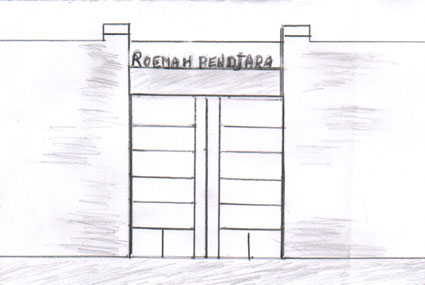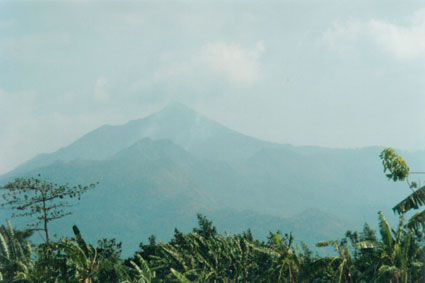My prison in Banyu Biru
There was no more news about my father, no more letters, the complete silence was very frightening. He had written us so many letters while he was in the Marine Kamp and most of those letters had been quite optimistic.
Christmas came, New Year came and so it was already 1944, almost two years ago that I had seen the first Japanese troops walking into Malang. To me it seemed many years ago and while I had felt absolutely safe at Sumber Sewu, I was now beginning to feel quite insecure at Malang because more and more people were transported to other camps.
The rumours were, that we would all be transported to Central Java. But since Henny was ill the four of us could not go before my sister was better again. Alas, on the 13 th of February 1944, we had to leave Malang. We had to pack our luggage and my mother, Henny, Jansje and I had to stand with many others on a truck when we were driven to the Malang station.
Along the road sides were many young Indonesians calling us, the Dutch women and children of our transport, all sort of names, they shouted at us that they were happy that the Dutch were captured by the Japanese. Slowly tears were coming into my eyes and I bowed my head.
This was happening in Malang, the town where I had been to school, where I proudly had received my two swimming certificates, where I had walked with my friends, where I had rode on my bike, where I had taken each Saturday my bus to Tretes Panggung and later to Sumber Sewu, where I had bought all sorts of sweets and peanuts from the Indonesian street vendors. In 1935 when we arrived at Malang I had asked my parents if I had to go to school and to a boarding house in Malang. The answer was; Yes! I felt so happy with that answer.
Now I had to leave this beautiful mountain town, “my Malang”, I had to leave my wonderful father behind in a Kempeitai prison. I couldn't stop the tears falling on my cheeks.
Adieu Daddy, adieu Malang.
At the station, we were pushed into long blinded goods-trains, we had to sit on dirty floors, and there was no toilet either. There was no food and worse, there was no water to drink. Luckily my mother had taken some bananas and something to drink with her for the four of us. She also had taken a toilet-pot with her and that was a great help for several of us. Little children started crying, especially when the train stood still ( sometimes several hours long) and that while the sun was shining on the roof, it was unbearable. We didn't know where we were brought to, we could hardly see anything at all. This horrible journey took more than 24 hours.
It was in the late afternoon of the 14 th of February that we arrived at the station of Ambarawa, in Central Java. A transport of 680 Dutch women and children from Malang stepped out of the train, happy to get some fresh air. The Japanese military yelled at us, and that yelling was translated for us by an interpreter, we all had to climb in the trucks, waiting for us outside the station. Everybody panicked about their luggage, my mother too, she hoped to find our four mattresses, so that at least we could sleep well that night. But we didn't see anything of our luggage at all.
The trucks drove through a beautiful landscape, and at least this time we didn't have to stand like we had to in Malang. We were all dead-tired, hungry and thirsty.
We arrived at Banyu Biru, we saw a place surrounded by very high walls. What could that be?
When we walked towards the entrance I read: ROEMAH PENDJARA, which means Prison.
My poor mother almost fainted and she said; “Oh my God, oh my God, how horrible!


My prison
Banyu Biru landscape


